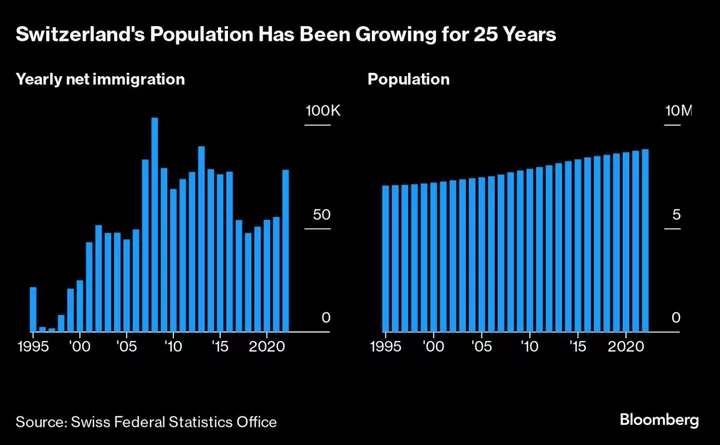Switzerland’s biggest party has decided that the country only has room for 10 million people — just as businesses struggle to fill vacancies.
The controversy over immigration and population growth is framing the country’s upcoming elections next month. Yet, some 40% of businesses say they have difficulties hiring more staff, according to a survey by the KOF economic research center, up from a long-term average of below 10%.
This stands in stark contrast with the flagship proposal of the Swiss People’s Party, which currently holds more than a quarter of seats in the lower house: a constitutional amendment that seeks to prevent the resident population from surpassing 10 million before 2050, from today’s 8.9 million.
The party, known as SVP, proposes to curb population growth if that threshold nears, by limiting immigration, especially from asylum seekers. KOF says the 10-million threshold will be crossed around 2035.
With elections set for Oct. 22, the campaign is resonating with voters. One in three Swiss say immigration is a key concern, according to a recent poll, and SVP is set to further increase its share.
Foreigners already make up a quarter of Switzerland’s population, yet even a 26% jump in new arrivals last year wasn’t enough to satisfy labor demand. Asylum seekers only make up 6% of new arrivals, and, at 2.1%, unemployment remains near to a record low.
“Lack of workers is the most relevant new issue for firms, and will likely stay with us for years to come,” said Jan-Egbert Sturm, who heads the KOF center at ETH Zurich university.
Switzerland’s high-wage labor market regularly taps the surrounding European Union for workers. A treaty in force since 2002 allows citizens from the bloc to freely come for work — subject to some exceptions.
The government’s success in luring multinationals such as Alphabet Inc.’s Google has helped propel home prices in Zurich past the levels of London and Paris. The left-wing Social Democratic Party wants to cut subsidies for international companies.
KOF estimates that, without immigration, Switzerland’s working age population would shrink by some 13% in the next 20 years — while the number of older people would increase, putting stress on the social security system.
“The Swiss labor market grows strongly above its demographic potential,” said Boris Zuercher, labor chief at the State Secratariat for Economic Affairs within the economy ministry. The country “has to make sure it stays attractive,” he added.









